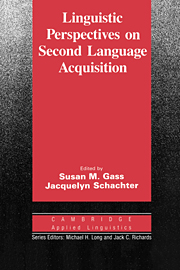Chapter 7 - Interlanguage and pragmatic word order
Published online by Cambridge University Press: 05 October 2012
Summary
Statements to the effect that the investigation of interlanguage (IL) is a valuable endeavor for any researcher interested in extending our knowledge about what language is and how it comes to be acquired are gradually becoming more common. Interlanguage phenomena in second language acquisition (SLA) have been cited in support of parameterization in Universal Grammar (Flynn and Espinal 1985; Hilles 1986), of a theory of implicational universals (Eckman 1984; Hawkins 1985), of theories of markedness (Zobl 1983a; Ferguson 1984), of accessibility hierarchies (Gass and Ard 1984), and so on. Whether or not the studies in question turn out to have been actual representations of the potential contributions of SLA research to general linguistic theory, they at least have begun to generate a healthy interest in IL as a valuable testing ground for such theory.
Among the language phenomena that have figured in much SLA research of the past four or five years is that of word order, and it is not very difficult to understand why this should be so. Word order constitutes one area of language organization in which a number of separate spheres of linguistic inquiry quite naturally converge. One could identify some of these spheres as Universal Grammar (UG) parameterization, typological work in the spirit of Greenberg, processoriented approaches such as that of Slobin, theories of language parsing as in the recent research of Frazier, and others.
- Type
- Chapter
- Information
- Linguistic Perspectives on Second Language Acquisition , pp. 163 - 182Publisher: Cambridge University PressPrint publication year: 1989
- 11
- Cited by



